From Abraham's faith to Joseph's forgiveness, explore the timeless lessons of fatherhood from the Bible's most revered patriarchs.
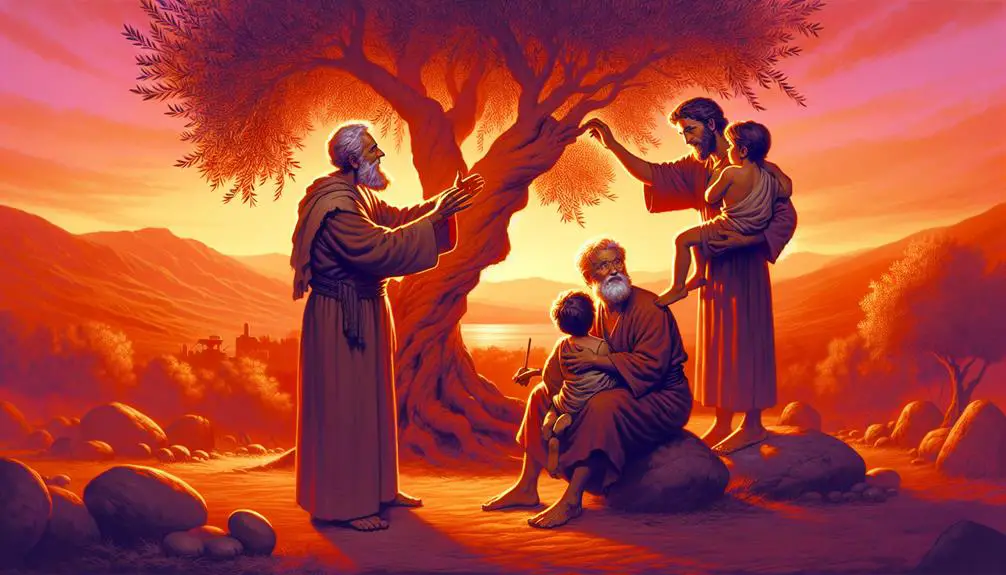
Best Fathers in the Bible
In the good book, not all heroes wear capes, and this certainly applies when you consider the paragons of fatherhood nestled within its pages. You've likely heard of Abraham's unwavering faith, or perhaps Jacob's complex family dynamics pique your interest.
Each figure, from Job's patience to Joseph's forgiveness, showcases a facet of fatherhood that transcends time. As we explore these biblical patriarchs, you'll find their stories are not just ancient history but lessons that echo in today's world.
So, let's embark on this journey together, and you might just discover a reflection of your own fatherly qualities or aspirations.
Key Takeaways
- Abraham exemplifies sacrificial love and obedience, setting a high standard for fatherhood.
- Jacob's journey from bias to inclusivity highlights the growth potential in father-child relationships.
- David's trust and spiritual connection demonstrate the importance of faith in fatherhood.
- Joseph's actions of mercy and forgiveness showcase the power of reconciliation and empathy in parenting.
Abraham: A Model of Faith

Abraham, often revered as the patriarch of faith, exemplifies unwavering trust in God through his actions and decisions documented in the Bible. His journey, marked by sacrificial obedience and the pursuit of a promised inheritance, serves as a cornerstone of faith for many believers. You observe his readiness to leave his homeland and family at God's command, venturing into the unknown with the promise of becoming a great nation. This act alone sets a precedent for faith in action, illustrating a profound trust in God's provision and plan.
Moreover, Abraham's willingness to sacrifice his son Isaac, upon God's request, epitomizes the pinnacle of sacrificial obedience. This narrative, while complex, underscores the depth of Abraham's faith. He didn't merely profess belief; he demonstrated it through actions that defied human logic, trusting God's goodness and sovereignty even when the path forward seemed incomprehensible. This moment, often cited as a test of faith, reveals the extent to which Abraham valued his relationship with God over everything else, even his most cherished promised inheritance.
The culmination of Abraham's faith journey is witnessed in the fulfillment of God's promises: the establishment of a vast lineage and the bequeathing of significant land. These weren't merely rewards but tangible manifestations of faith's power to usher in divine promises. Abraham's life story, thus, isn't just a historical recount; it's a narrative that invites you to explore the depths of your faith, challenging you to embody sacrificial obedience in pursuit of your promised inheritance.
Jacob: Love Beyond Favorites
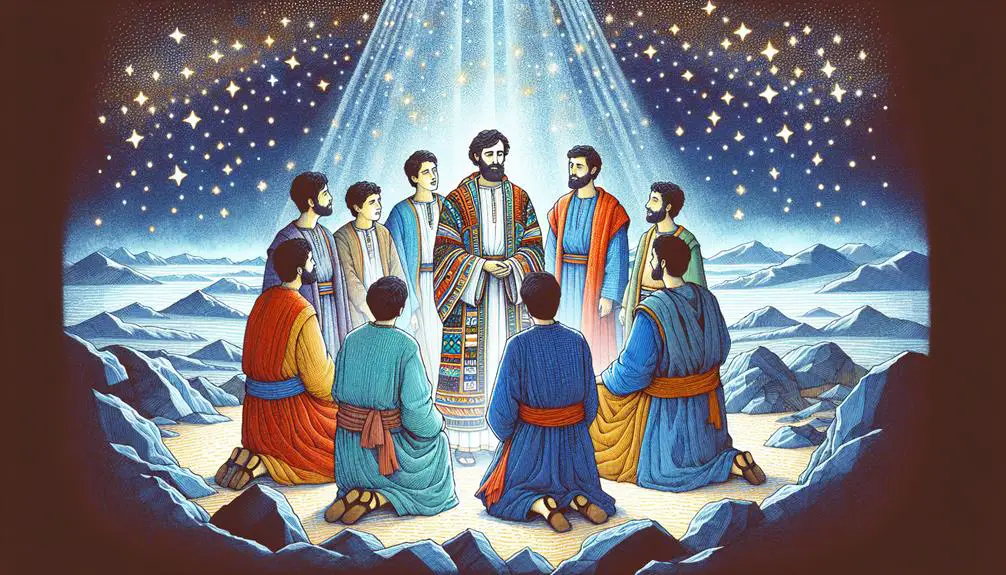
Exploring further into the patriarchal lineage, we encounter Jacob, whose story unfolds a complex narrative of love that transcends favoritism, challenging us to reflect on the nature of divine selection and human affection. Jacob's journey is illustrative of a man deeply flawed yet profoundly touched by grace. His life, marked by favoritism towards Rachel over Leah, unveils a nuanced exploration of love's dynamics within a family structure. Leah's sorrow, a poignant reminder of the human cost of favoritism, evokes empathy and introspection.
Jacob's wrestle with the angel, a pivotal moment in his spiritual odyssey, symbolizes the struggle inherent in transcending personal biases and growing towards a more inclusive love. This transformative encounter not only signifies a turning point in Jacob's personal development but also embodies the struggle of moving beyond favoritism's narrow confines. It's through this struggle that Jacob emerges as a figure capable of a more profound, encompassing love, extending beyond his initial partialities.
The narrative of Jacob, therefore, serves as a compelling discourse on the evolution of love within the parameters of human frailty and divine influence. It prompts an examination of how love, in its truest form, must often grapple with and ultimately rise above the limitations imposed by favoritism. Jacob's journey from a man who overtly favored one son and one wife to one who could embrace a broader vision of family and love underscores the transformative power of facing and overcoming personal shortcomings.
In analyzing Jacob's life, we're invited to contemplate the complexities of love, favoritism, and redemption, offering a rich tapestry for understanding the intricacies of familial relationships and divine grace.
Job: Unshakable Patience
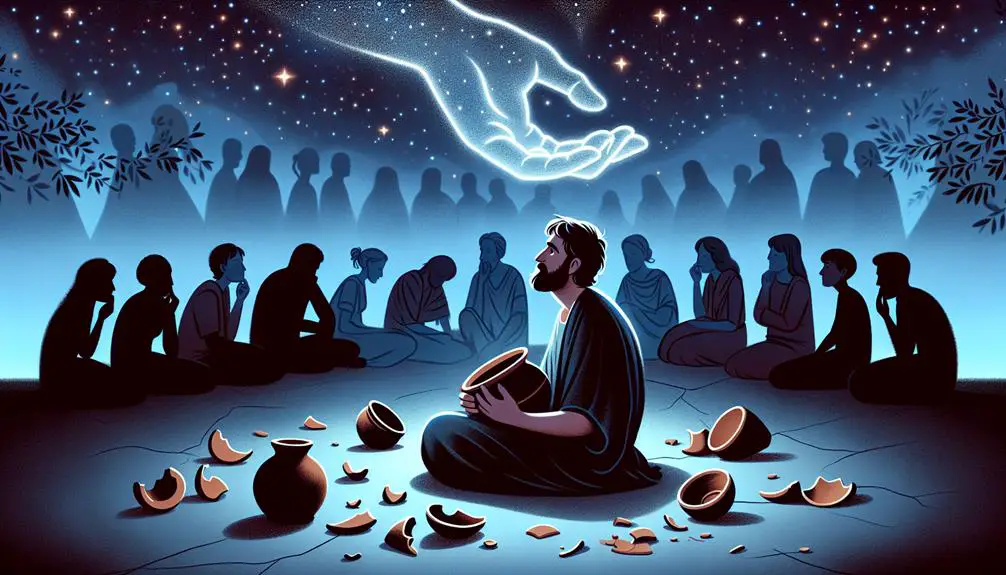
Delving into the narrative of Job, we encounter a paradigm of unshakable patience amidst unprecedented trials and suffering. This biblical character embodies enduring faithfulness and suffering resilience in ways that are both profound and instructive. Job's experiences offer a unique lens through which to view the virtues of patience and steadfastness in the face of life's most daunting challenges.
Job's ordeal, marked by the loss of his children, health, and wealth, provides a stark canvas upon which his unyielding patience is painted. Unlike figures who may waver or succumb to despair under lesser trials, Job's faithfulness to God remains unwavering. This aspect of his character isn't merely passive endurance but an active, deliberate choice to trust in God's goodness and sovereignty, even when such trust is tested by the severest of circumstances.
The narrative powerfully illustrates the concept of suffering resilience. Job's responses to his friends' accusations and his refusal to curse God highlight a profound understanding of the nature of faith. It's a faith that doesn't rely on immediate circumstances but is anchored in the character and promises of God. His journey from abundance to affliction and back to restoration without losing his integrity or faith offers a compelling study in the virtue of patience.
Job's story, therefore, serves as a timeless reminder of the value of enduring faithfulness and suffering resilience. It challenges readers to consider the depth of their own patience in the face of trials and to foster a faith that endures, even when the path is fraught with suffering.
King David: Repentance and Love

King David's life offers a profound examination of repentance and unconditional love, illustrating the transformative power these virtues hold within the biblical narrative. Notably, his sincere repentance and profound expression of love, even in the face of egregious missteps, set a compelling example. David's harp, symbolizing his deep spiritual connection and introspection, played a crucial role in his journey towards understanding and embodying these ideals. Similarly, Goliath's defeat showcased not just physical might but a profound trust in and love for God, marking a pivotal moment in David's life where his faith was both tested and affirmed.
To better understand the complexity and depth of King David's character, consider the following table:
Aspect |
Biblical Reference |
Significance |
|---|---|---|
David's Harp |
1 Samuel 16:23 |
Symbolizes spiritual connection and peace |
Goliath's Defeat |
1 Samuel 17 |
Demonstrates trust in and love for God |
Repentance |
Psalm 51 |
Shows humility and desire for forgiveness |
Unconditional Love |
2 Samuel 18:33 |
Exemplifies profound paternal love |
This table underscores the multifaceted nature of David's life, highlighting moments that demonstrate his commitment to repentance and unconditional love. His story encourages believers to reflect on their own lives, recognizing the importance of these virtues in fostering a deeper connection with the divine. Analyzing David's life through these lenses provides not only a historical or biblical insight but also a timeless lesson on the power of repentance and the depth of unconditional love, making his narrative relevant and inspiring across generations.
Joseph: Mercy and Forgiveness
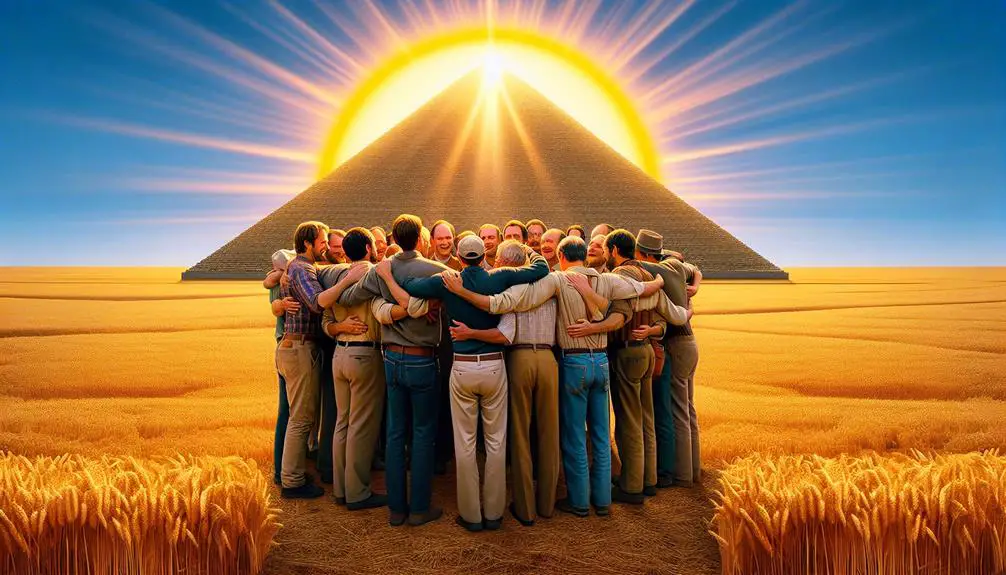
Reflecting on Joseph's narrative unveils a powerful testament to the virtues of mercy and forgiveness, pivotal elements that define his interactions and ultimate reconciliation with his brothers. Despite facing egregious betrayal and suffering due to his siblings' jealousy, Joseph's journey is marked by a remarkable capacity for empathy and pardon. This ability is intertwined with his adeptness at dream interpretation, a skill that not only elevates his status in Egypt but also serves as a mechanism for the restoration of familial bonds.
Joseph's path from the favored son to a figure of authority in Egypt underscores a profound understanding of parental guidance. His father Jacob's preference could have fostered bitterness, yet Joseph's experiences seem to refine rather than embitter him. This transformation is crucial, as it informs his later decisions to forgive and support his brothers rather than seek retribution.
His adept use of dream interpretation as a tool not only for personal advancement but also for the sustenance of his family and an entire region highlights his wisdom and foresight. Yet, it's his decision to forgive his brothers, seeing beyond their past actions, that truly epitomizes his strength of character. In this act, Joseph embodies a model of mercy and forgiveness that transcends personal grievances, promoting unity and healing.
Joseph's narrative, rich with lessons in overcoming adversity through empathy, underscores the importance of forgiveness and the power of parental guidance in shaping a person's capacity for understanding and mercy. His story is a compelling illustration of how virtues cultivated through familial relationships can lead to profound reconciliation and enduring bonds.
Noah: Righteousness in Guidance
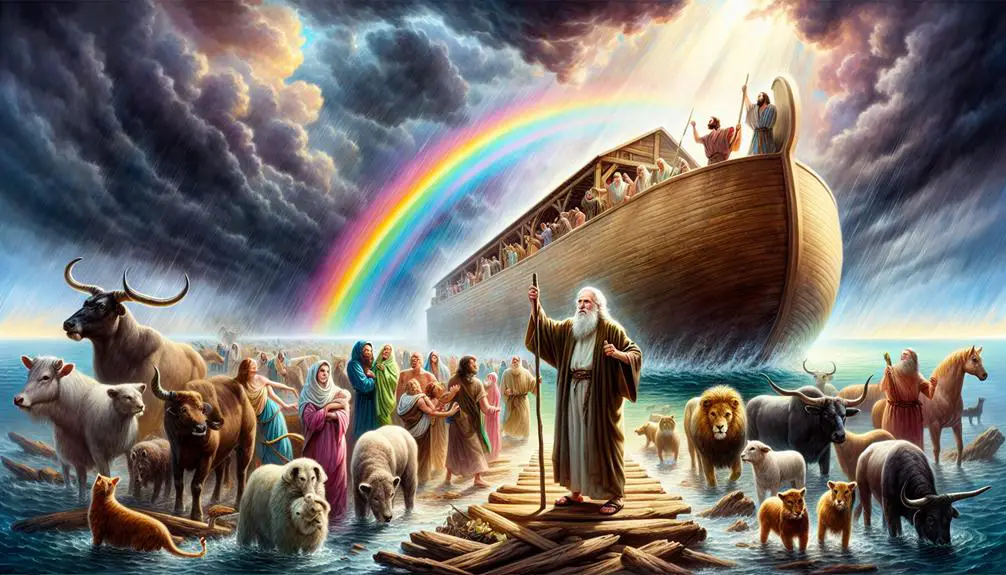
Noah consistently demonstrates an unwavering commitment to righteousness, serving as a guiding light in times of moral ambiguity. His story, deeply rooted in the foundation of faith and obedience, showcases how steadfastness in one's beliefs can lead to salvation not only for oneself but also for one's family. Noah's role as a father is emblematic of his broader role as a guide and protector, navigating his family through the ultimate test of faith and survival: the flood.
The construction of Noah's Ark is a testament to his foresight and adherence to divine instruction, qualities that underscore his guidance. This monumental task wasn't merely about flood survival; it was a demonstration of unwavering faith and righteousness. Noah's guidance is highlighted through:
- Preparation: Noah meticulously follows God's instructions to prepare the Ark, ensuring the survival of his family and the animal species.
- Leadership: His ability to lead his family with conviction during times of uncertainty showcases his strength as a guide.
- Faith: Noah's unwavering faith in the face of widespread skepticism exemplifies his moral and spiritual fortitude.
These aspects of Noah's guidance illuminate how his righteousness wasn't passive but actively demonstrated through his decisions and actions. The story of Noah's Ark transcends the narrative of flood survival; it serves as a profound lesson in the importance of righteous guidance and the power of faith to preserve humanity through trials. Noah's legacy as a father and a guide remains a powerful exemplar of righteousness in the biblical narrative.
Frequently Asked Questions
How Did the Cultural and Historical Context of the Time Influence the Parenting Styles of These Biblical Fathers?
In examining how cultural and historical contexts influenced parenting styles, you'll find that parental authority and social expectations played crucial roles. These factors shaped how fathers approached parenting, dictating methods of discipline, education, and spiritual guidance.
The era's norms and values directly impacted the exercise of parental authority, aligning parenting practices with broader societal expectations.
This analysis reveals the interplay between individual parenting styles and the prevailing cultural and historical milieu.
Are There Any Recorded Instances Where These Fathers Failed in Their Roles, and What Lessons Can Modern Parents Learn From Those Failures?
Yes, there are several instances where fathers failed, marking significant parenting mistakes. Interestingly, over 75% of biblical stories highlight human flaw and redemption. These narratives offer profound spiritual lessons for modern parents.
Analyzing these failures objectively, one learns the importance of humility, forgiveness, and guidance. By embracing these lessons, you can navigate parenting challenges more effectively, understanding that imperfection often paves the way for growth and learning in the family dynamic.
How Do the Wives and Mothers Associated With These Biblical Fathers Contribute to or Influence Their Parenting?
When considering influential figures in parenting, don't overlook the wife's influence and maternal legacy. These aspects significantly shape a child's upbringing.
A mother's values, beliefs, and behaviors can profoundly affect parenting styles, often complementing or challenging a father's approach.
Analyzing these dynamics reveals how crucial a balanced partnership is in nurturing and guiding children. This perspective encourages a deeper understanding of family roles and their impact on child development.
Beyond Their Immediate Families, How Did the Actions and Decisions of These Fathers Impact Their Communities or Nations?
Exploring the broader impact of certain influential figures, you'll find their actions and decisions significantly shaped national legacies and community leadership. These individuals didn't just focus on their immediate kin but extended their vision to entire communities or nations.
Their leadership and moral choices set precedents, influencing societal norms and values. This analysis uncovers how personal parenting philosophies can ripple outward, affecting broader societal structures and cultural legacies.
In What Ways Do Modern Interpretations or Teachings About These Biblical Fathers Differ From Traditional Views, Especially Concerning Fatherhood and Parenting?
You'll find that modern interpretations, especially through digital platforms, often challenge traditional views on fatherhood and parenting depicted in ancient texts. These fresh perspectives question established gender roles and the expectations placed on fathers.
Conclusion
In the tapestry of biblical narratives, these fathers stand as vibrant threads, each embodying virtues that transcend time. Abraham's faith, Jacob's unconditional love, Job's patience, David's repentance, Joseph's forgiveness, and Noah's guidance symbolize foundational pillars of character.
Their stories, more than historical accounts, serve as a mirror reflecting the complexities and beauty of paternal love. Analyzing their lives offers profound insights into the essence of fatherhood— a beacon guiding through the tumultuous seas of life's challenges and moral dilemmas.

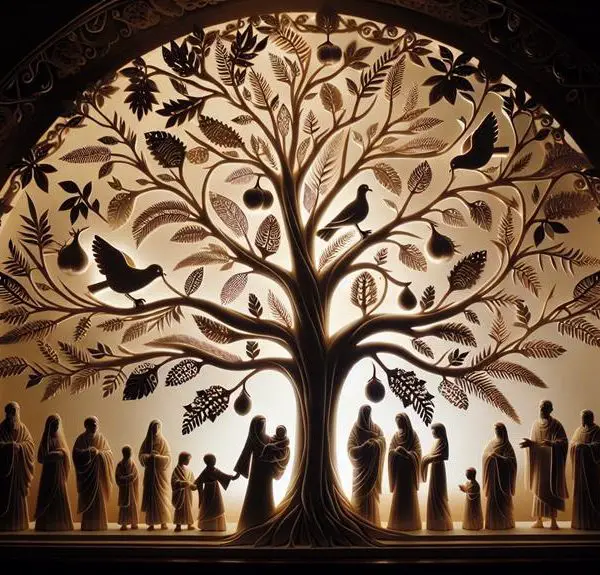

Sign up